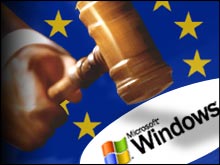Microsoft loss is bad news for Apple, GoogleIn affirming nearly $1 billion in fines against the software giant, a European court may have just made life a lot more difficult for U.S. technology companies, writes Fortune's Jon Fortt.(Fortune Magazine) -- The verdict is in: Europe's tough antitrust authorities have the power they were looking for to crack down on U.S. companies they believe are illegally limiting competition and harming consumers. That's the clear message a European appeals court sent Monday when, in a historic decision, it reaffirmed nearly $1 billion in fines against Microsoft for abusing its Windows operating system monopoly to keep competitors out.  Video While the decision socks Microsoft (Charts, Fortune 500) in the pocketbook, it's also a big blow to several U.S. tech giants that have run afoul of E.U. regulators in recent years. Intel (Charts, Fortune 500), for instance, is being investigated for the way it prices its computer chips. E.U. watchdogs are also probing Apple's (Charts, Fortune 500) pricing of music downloads. And Google's (Charts, Fortune 500) planned buyout of advertising giant DoubleClick has raised fears over the search giant's power to set ad rates in the digital world. Indeed, U.S. tech companies might find that emboldened E.U. regulators are worse for them than for Microsoft. Microsoft, after all, is no longer the 800-pound gorilla it once was, and the focus of the E.U.'s antitrust case was on two products that are not the software giant's core business. In the case of Intel, Apple and Google, regulators are questioning products that are each company's bread and butter, which means any restrictions on their business practices could have a severe impact on revenues. The roots of Microsoft's troubles in Europe date to 1998, when regulators began looking into the company's monopoly in operating system software and its practice of bundling new products into Windows, which runs more than 90 percent of the world's computers. In 2004 - three years after Microsoft settled an antitrust case with U.S. regulators over the same bundling tactics - the European Commission fined the company a record 497 million euros (about $690 million). The commission found that Microsoft unfairly used Windows to lock out competition in the market for media player software and workgroup servers. Last year the commission ordered Microsoft to pay another 280.5 million euros (about $390 million) for not complying with its earlier ruling. Those fines and the E.U.'s underlying findings were the subject of Monday's long-awaited court decision. The ruling from the European Court of First Instance, the Luxembourg-based court that reviews commission cases against businesses, came down at 3:30 a.m. eastern time. Microsoft has not said whether it plans to appeal the court's ruling. Randal C. Picker, an antitrust law professor at the University of Chicago, said it's early to draw conclusions from the densely worded decision, which runs close to 250 pages. But, he noted, the appeals court found that Microsoft broke the law by refusing to make its dominant Windows software interoperable with competing products. Dominant technology businesses, the court ruled, must allow competitors' products to work on their platforms. Interpreted broadly, such interoperability rules could be used to force Apple to make the iPod work with rival music services, or to make iTunes work with rival music players. Some might even try to use the wording to push Google to reveal how its top-secret search algorithm prioritizes web pages. "Apple has had a number of situations where it has effectively blocked interoperability [of the iPod and iTunes] with competitors," Picker said. "So if this decision says that interoperability is important in the situation of someone who has a dominant position, Apple obviously has interoperability issues as well - pretty directly so." At a press conference before the appeals court decision, Microsoft general counsel Brad Smith also singled out Apple. "Look at the world of digital media today," Smith said, speaking in Brussels. "Apple has something like a 70 percent market share for digital music; iTunes is far and away the leading source for music on the Internet; the iPod is far and away the leading hardware device for digital music." And yet, Smith noted, Apple refuses to allow competing products to work on its devices -- the same behavior that landed Microsoft in hot water. An Apple spokesperson did not return a call for comment Monday. |
Sponsors
|
